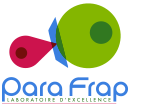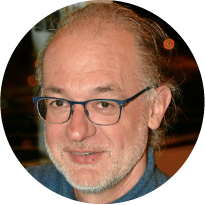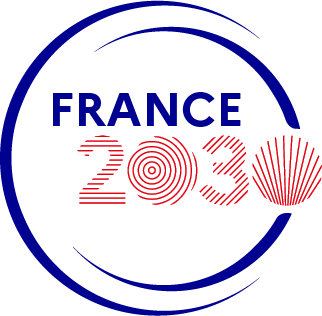

 |
Artur SCHERF |
|
|
Information |
||
| Biology of Host Parasite Interactions | ||
| Paris, Institut Pasteur | ||
| 0000-0003-2411-3328 | ||
| This email address is being protected from spambots. You need JavaScript enabled to view it. | ||
| https://research.pasteur.fr/en/team/biology-of-host-parasite-interactions/ | ||
|
Scientific interests and projects |
||
|
The ‘Biology of Host-Parasite Interactions (BIHP)’ Unit, led by Prof Artur Scherf (DRCE CNRS), comprises 4 groups with a research focus on malaria parasite virulence, pathogenesis, liver stage infection and host immune responses to establish the molecular and cellular bases of parasite strategies to successfully complete the life cycle. By integrating a novel humanized mouse model, a rodent malaria model and mosquitoes, our studies address key biological aspects of the different stages of the life cycle development of Plasmodium falciparum and P. berghei. Activities of team members within ParaFrap: SCHERF A. has spearheaded the discovery of gene regulatory mechanisms over more than two decades. A main focus is on epigenetic factors that control 3-D spatial organization, transcription and posttranscriptional control of gene regulation with a particular focus on antigenic variation. The team uses routinely a wide array of techniques in literally all stages of the parasite life cycle, including genome-wide approaches such as ChIP-seq and RNA/DNA-seq as well as targeted genome editing. More recently, the team has developed in collaboration with a medicinal chemist (P. Arimondo, Institut Pasteur), distinct epigenetic compounds that kill efficiently multidrug resistant P. falciparum including artemisinin resistant strains and are active against transmission stages. Validation of lead epigenetic compounds using P. falciparum and P. vivax liver stages including hypnozoites, infected mosquitoes and humanized mouse models is an ongoing activity. MANCIO SILVA L. has a long-term interest in understanding the malaria parasite interaction with hepatocytes and the interventions needed to control malaria disease. She is using rodent malaria models, sophisticated human hepatocyte culture systems and live imaging approaches to study sporozoite invasion and development in hepatocytes with a focus on the role of distinct metabolic states of host cells in infection. GARCIA S. has a strong expertise on humanized mouse experimentation and has improved this model for studies of P. falciparum with the potential to establish this new model to study P. vivax. |
||
|
Top 5 publications of the last 5 years |
||
|
1. Baumgarten S, Bryant JM, Sinha A, Reyser T, Preiser PR, Dedon PC, Scherf A. Transcriptome-wide dynamics of extensive m6A mRNA methylation during Plasmodium falciparum blood-stage development. Nat Microbiol. 2019 Aug 5. doi: 10.1038/s41564-019-0521-7. 2. Mancio-Silva L, Slavic K, Grilo Ruivo MT, Grosso AR, Modrzynska KK, Vera IM, Sales-Dias J, Gomes AR, MacPherson CR, Crozet P, Adamo M, Baena-Gonzalez E, Tewari R, Llinás M, Billker O, Mota MM. Nutrient sensing modulates malaria parasite virulence. Nature. 2017 Jul 13;547(7662):213-216. doi: 10.1038/nature23009. 3. MacPherson C. and A. Scherf. Protospacer Workbench: flexible guide-RNA design for CRISPR applications. Nat. Biotechnol. 2015 Aug;33(8):805-6. doi: 10.1038/nbt.3291. Epub 2015 Jun 29.3 4. Ghorbal M, Gorman M, Macpherson CR, Martins RM, Scherf A, Lopez-Rubio JJ. Genome editing in the human malaria parasite Plasmodium falciparum using the CRISPR-Cas9 system. Nat Biotechnol. 2014 Jun 1. doi: 10.1038/nbt.2925 5. Zhang Q, Siegel TN, Martins RM, Wang F, Cao J, Gao Q, Cheng X, Jiang L, Hon CC, Scheidig-Benatar C, Sakamoto H, Turner L, Jensen AT, Claes A, Guizetti J, Malmquist NA, Scherf A. Exonuclease-mediated degradation of nascent RNA silences genes linked to severe malaria. Nature. 2014 Jun 29. (Research Highlights in Nat. Reviews Microbiol) doi: 10.1038/nature13468 |
||
The INSERM workshop “Modern methods in molecular parasitology” will take place in Montpellier, France, from 4–6 November 2026. This event will bring together leading experts in...
The 15th CAPF (French Anti-Parasitic and Anti-Fungal Consortium) workshop will take place on 16–17 March 2026 in Strasbourg (France). This event is an excellent opportunity for students and postdoctoral researchers to participate and contribute...
Call for Applications: New Junior Research Groups at Institut Pasteur The Institut Pasteur has launched an international call to recruit new junior group leaders.This is a unique opportunity for high-potential scientists to...
JOB : Ingénieur·e d’étude / Research Engineer – Mosquito Immunity (IBMC, Strasbourg) 🇫🇷 Le laboratoire Mosquito Immune Responses recrute un·e ingénieur·e d’étude à l’IBMC (Strasbourg). La personne recrutée sera en...
Applications are now open for the 2026 Biology of Parasitism (BoP) course, taking place June 12–July 23, 2026 at the Marine Biological Laboratory in Woods Hole, MA.This intensive 6-week program offers PhD students and postdocs advanced training in...
Newcastle University offers a full-time, fixed-term position (3 years) for a Research Assistant or Research Associate in Molecular Parasitology — funded by the Medical Research Council (MRC). About the Opportunity Location:...
Multidisciplinary PhD opportunity in the fields of infectious diseases, gene regulations and molecular signalisation. Fully Funded 4-Year PhD at the University of York A fully funded PhD opportunity is available at the...
The EMBO Workshop 2025 “Host–Parasite Relationship: From Mechanisms to Control Strategies”, took place from October 5–8, 2025, on the beautiful Île des Embiez (France). Organized within the framework of the LabEx ParaFrap and...
Postdoc (M/F) in molecular and biochemical parasitology (Toxoplasma gondii) A 24-month post-doctoral position starting on January 2026 and funded by the French National Research Agency (ANR) is available in the in the...
Postdoc (M/F) Molecular and cell biology in Trypanosoma brucei A 24-month post-doctoral position starting on November 1st 2025 (or before) and funded by the French National Research Agency (ANR) is available in the...

© 2023. All rights reserved MLCOM
Notre site LabEx ParaFrap utilise des cookies pour réaliser des statistiques de visites, partager des contenus sur les réseaux sociaux et améliorer votre expérience. En refusant les cookies, certains services seront amenés à ne pas fonctionner correctement. Nous conservons votre choix pendant 30 jours. Vous pouvez changer d'avis en cliquant sur le bouton 'Cookies' en bas à gauche de chaque page de notre site. En savoir plus
Ce site utilise des cookies pour assurer son bon fonctionnement et ne peuvent pas être désactivés de nos systèmes. Nous ne les utilisons pas à des fins publicitaires. Si ces cookies sont bloqués, certaines parties du site ne pourront pas fonctionner.
Ce site utilise des cookies de mesure et d’analyse d’audience, tels que Google Analytics et Google Ads, afin d’évaluer et d’améliorer notre site internet.
Ce site utilise des composants tiers, tels que NotAllowedScript699220d911c6fReCAPTCHA, Google NotAllowedScript699220d911956Maps, MailChimp ou Calameo, qui peuvent déposer des cookies sur votre machine. Si vous décider de bloquer un composant, le contenu ne s’affichera pas
Des plug-ins de réseaux sociaux et de vidéos, qui exploitent des cookies, sont présents sur ce site web. Ils permettent d’améliorer la convivialité et la promotion du site grâce à différentes interactions sociales.
Ce site web utilise un certain nombre de cookies pour gérer, par exemple, les sessions utilisateurs.

